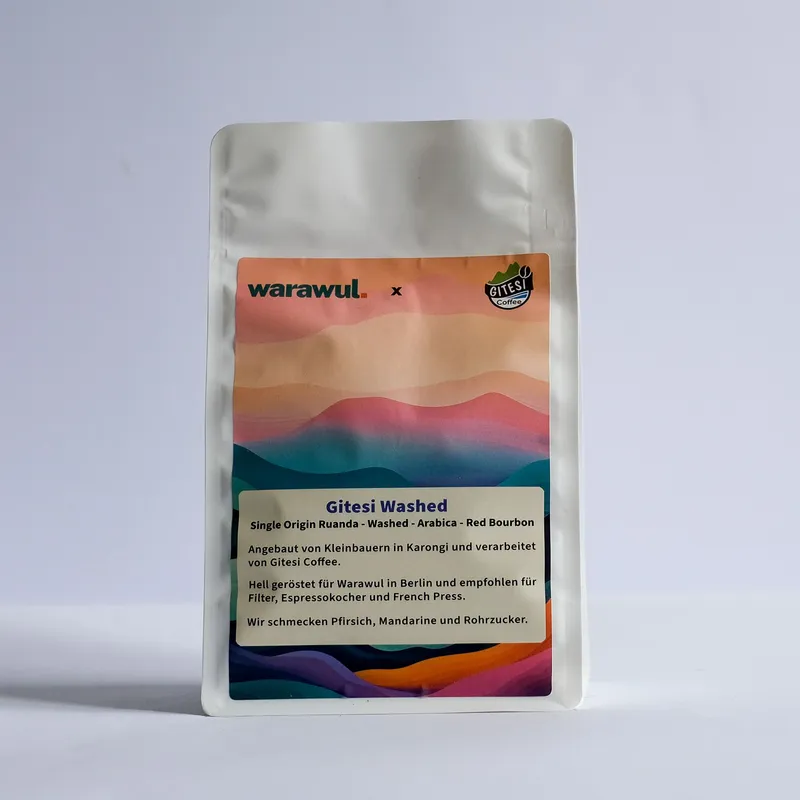Gitesi Washed is an Arabica coffee of the Red Bourbon variety, which produces clear and delicate flavors in the cup. The coffee is grown by smallholder farmers in the highlands above Lake Kivu, where the climate is mild. The harvested coffee cherries are taken to the Gitesi Coffee Washing Station, where Aimé Gahizi and the Gitesi Coffee team carefully conduct a controlled fermentation and washing process. The result is a clear and delicate flavor profile that is a true delight.

Gitesi Washed
Aimé is the managing director of Gitesi Coffee. In 2011, he joined his father, Alexis Gahizi, to run operations of the Gitesi Washing Station, located in Rwanda’s Karongi District. Today, Aimé is leading the business.
His mission is two-fold. First, to elevate the quality of the coffee produced by Gitesi. And second, to uplift the livelihoods of farmers in his community. For this, Aimé and his team have implemented new processing methods to create highly lauded specialty coffees.
![[object Object]](https://cdn.sanity.io/images/qb5ht1wp/production/18cc98354e4e81542ebf4fe4d84b9ee4d226f7dc-7952x5304.jpg?rect=440%2C0%2C7072%2C5304&fm=webp&w=1200&h=900&q=85&fit=min)
About Gitesi Washed
![[object Object]](https://cdn.sanity.io/images/qb5ht1wp/production/855140afa02ddf631131cb7914c139d6b23ead18-5472x3648.jpg?rect=304%2C0%2C4864%2C3648&fm=webp&w=1200&h=900&q=85&fit=min)
Small-scale farmers from the region surrounding Lake Kivu grow high quality Red Bourbon Arabica coffee. They deliver their ripe red coffee cherries to the Gitesi Coffee Washing Station.
The cool climate at an altitude of approximately 1700 meters above sea level facilitates precise control over the fermentation during the washed process. Subsequently, the coffee undergoes washing and is then immersed in clean water for an overnight soak. Finally, it is carefully dried on raised African drying beds for a period of up to two weeks.
The outcome is a smooth and clear coffee teeming with flavor.
![[object Object]](https://cdn.sanity.io/images/qb5ht1wp/production/b7f838c3f4d03b7a8de41adbb51fd9c5411f352c-2048x1365.jpg?rect=114%2C0%2C1820%2C1365&fm=webp&w=1200&h=900&q=85&fit=min)

Preparation of 25g coffee beans, ground with a setting of 17 clicks on the Timemore C3S Pro (equivalent to ~ 630 μm) with 400 ml water at a temperature of 96°C. Results in a fine fruity note with a balanced acidity. Avoid astringency by adjusting the grind size coarser. Better in a flat bottom than a conical filter.
Hint: Try in a Hario Switch to taste the full aroma spectrum of this coffee.
![[object Object]](https://cdn.sanity.io/images/qb5ht1wp/production/fbfe2ee8fa6a1a9f61474b8a5dcb3c424f4b2c94-7952x5304.jpg?rect=440%2C0%2C7072%2C5304&fm=webp&w=1200&h=800&q=85&fit=min)
The Gitesi Coffee Washing Station is located in the hills bordering Lake Kivu. It processes the coffee cherries from around 1,800 smallholder farmers. The farmers usually grow and pick their coffee cherries and then bring them to the washing station. The washing station then processes the coffee either as a washed coffee, natural, or honey.
To make their operations sustainable, Gitesi has created a comprehensive water purification system for their wastewater. The washing station also has a waste management system and produces organic and natural fertilizer from the pulp of the coffee cherries.